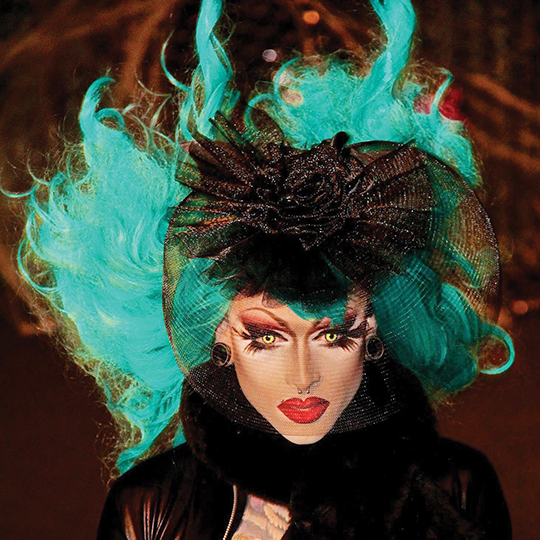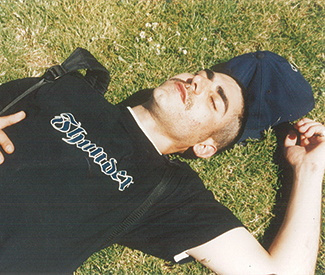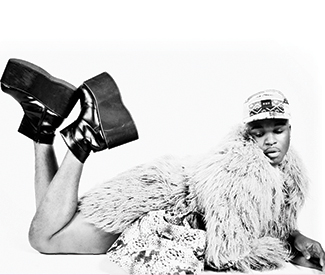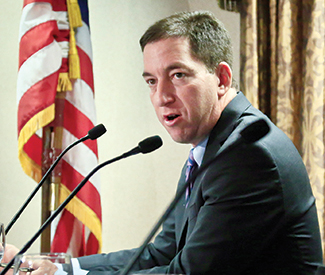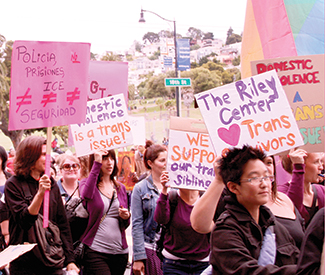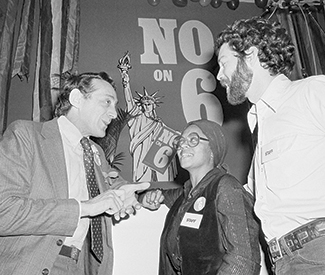On May 22, the US Postal Service released the groundbreaking Harvey Milk stamp. Earlier this month we asked our readers, “Which US queer icon should next appear on a postage stamp?” We received a flood of answers, and while we have our own dream mail models — Sylvia Rivera, Barbara Gittings, Jose “Empress I” Sarria, Thom Gunn, Vicki Marlane — we chose the most popular readers’ picks for a little “Forever” fantasy fulfillment. (Maybe some of these won’t end up as fantasies after all!)
Volume 48 Number 39
ID, please
QUEER ISSUE “One night my wife and I were having a conversation with our friend from Brazil about the bear community, and she had no idea what we were talking about. She said there are no words for identities like bears, cubs, or otters in Brazil — and I realized that the queer community has all of these amazing identities that don’t fall within the traditional LGBT umbrella. I got the idea to photograph my community and share with the world who they are and how they identify. I want to destroy the traditional understanding of what LGBT looks like. The Bay Area is a kick ass place to do just that.”
Since Sarah Deragon launched the Identity Project (www.identityprojectsf.com) in January of this year — using funds she raised on IndieGoGo — she’s captured dozens of community members in vibrant, sharply focused black-and-white protraits. Each portrait is labeled with an “identity,” expressed in the the subject’s own terms. It’s a heady mix of the familiar and the unique, containing lovely twists like “Three Spirit,” “Sober Celibate Daddy-Father Punk,” and “Xicanita y Cubanita.”
A portraitist by trade (www.portraitstothepeople.com), Deragon will be taking the Identity Project on the road this summer to Portland, Chicago, Columbus, New York, Austin — prospective participants can apply at the Identity Project site.
“I am totally inspired by the ways in which folks choose to identify and how they engage with and take care of their communities,” Deragon says. “I am out in my photography business and that means the world to me. I can be my full self in the Bay Area and I know how lucky I am to say that. It is pretty amazing that a portrait photography business can support two people in San Francisco with the rents as crazy as they are.”
As a self-identified queer femme, Deragon says her own community plays a crucial role. “Most of all, I want to give a shout out to the femme community because they have everything to do with the person that I am today!”
The Guardian Hot Pink List 2014
Every year, we single out members of the LGBT community for special appreciation — activists, performers, artists, or just plain cool peeps who rocked out socks off.
Pride on fire!
Get Baked
culture@sfbg.com
CHOW NOW
Anyone who has fallen in love with the bagels from Marla Bakery Kitchen Communal, or the cookies and breads from one of Marla Bakery’s farmers market stands will be happy to know the duo behind all these goodies just opened a brick-and-mortar location in the Outer Richmond. But before you say, “Oh well, I live in Potrero Hill,” there’s a lot that will make you want to make the trek to Marla Bakery (3619 Balboa, SF. www.marlabakery.com), which is more than just a bakery. Owners Amy Brown and Joe Wolf have been hard at work getting the space together for some time: Wait until you see the custom wood-fired oven (the Marla 2000). And then there’s the comfortable dining room, with 26 seats, lots of wood, and hey now, check out that intoxicating aroma of fresh-baked goods. There’s also a patio out back, with a garden designed by Paxton Gate (look for the patio to get more dialed in coming weeks).
Marla will take good care of you during the morning, with coffee and bagels and quiche and pastries (don’t attempt to do it all at once), and some sit-down breakfast fare, like baked eggs with reduced thyme cream, roasted leeks, sugar snap peas, and Gruyère. Lunch — think farro grain salad, a special version of a club sandwich, and a marinated mushroom sandwich, all made on Marla’s own breads. Dinner starts as a Sunday supper on Sun/29. By Tue/1, regular service will be in full effect, with breakfast, lunch, dinner, and weekend brunch. Bonus: Some well-chosen wines, beers, and vermouths are available, all to help encourage day drinking and hanging out. Anytime is a good time for Mexican coffee pot de crème, right?
Whether you’re looking for a place to pick up a gorgeous steak to cook at home in your treasured cast-iron skillet, or you’d just like someone to bring a tartare to your table while you sit and look pretty, the new Belcampo Meat Company (1998 Polk, SF. www.belcampomeatco.com) has you covered. Russian Hill neighbors are especially stoked. Belcampo is a unique company: It raises its animals humanely and organically on a farm in Mount Shasta, and it has its own state-of-the-art slaughterhouse facility. The butcher shop (open daily 9am–8pm) looks classic, but the meats and cuts are varied, including pork, beef, poultry, and rabbits. The 34-seat restaurant serves dinner nightly 5:30pm–10pm, and chef Chris Gerwig (formerly of A16 and New York’s Pulino’s) has more than just meaty options for you. Don’t just expect a menu of duck and chicken giblet skewers and fried guinea hen, although you can get those items too. It’s a handsome space, with lots of wood and cobalt blue leather banquettes (made from their own steer hides).
DRINK UP
Tea aficionados will want to beeline to the new Samovar location (411 Valencia, SF. www.samovartea.com). This branch of the small chain is unique — the soothing and monochromatic interior is modern and eye-catching, designed to highlight the tea-brewing process. Along the counter, you’ll see a row of tea-brewing “crucible” machines (no teabags here!), which make the brewing totally visible and engaging. There are a few different teas you can choose from (including black, green, and herbal), and there are also big copper urns where you can get a few ladles of masala chai, creamy and spiced beautifully (a cup is $3–$5). Seasonal cold-brewed iced teas and matcha shots — and shakes! — will be available, as well as freshly baked scones, savory and sweet. It’s laid out so people can swing by and easily get their tea to go, but there’s a bench and ledge where you can linger if you want. (which means you get to enjoy drinking out of a custom ceramic tea cup designed in conjunction with Atelier Dion). Hours are 7am–7pm.
Marcia Gagliardi is the founder of the weekly tablehopper e-column; subscribe for more at www.tablehopper.com. Get her app: Tablehopper’s Top Late-Night Eats. On Twitter: @tablehopper.
Summer spins
BORIS
NOISE
(SARGENT HOUSE)
Boris have been dabbling so much in pop lately it’s tempting to look at the band’s latest album, Noise, as a return to their sludge-metal glory days. There are only eight songs, its title is appropriately hostile, and the dark gray cover looks formidable compared to the white-hued, glamorous art on the last few Boris records. But remember: This album is called Noise. Not Metal, not Amps Up To 11. Not even Heavy Rocks, the name given to two of Boris’s most metallic albums. Noise.
And noise is what it offers. These songs are loud, but not in a metallic way — the guitars don’t confront or cut into the red, preferring to simply churn away in the background. Yet this is the only thing really connecting these songs. Noise veers from J-pop to shoegaze to something fairly close to metal, charting a path that ends up sounding more like overly ambitious hardcore punk. Accordingly, it suffers from an identity crisis. As another chapter in the capricious experimental period the band’s been stuck in for the last half-decade, Noise is an interesting curiosity. But if you choose to view it as a return to form, you’re likely to come out of your listening experience very depressed.
LANA DEL REY
ULTRAVIOLENCE
(INTERSCOPE/POLYDOR)
Lana Del Rey embodies the trashiest, most cartoonish version of American iconography. Her music reeks of Gatsby, guns, Hollywood, star-spangled banners, Marilyn Monroe, and just about every other cartoon of superficial American glamour. It thus makes sense on paper that she should pair up with producer Dan Auerbach for her second album, Ultraviolence; his band the Black Keys excavates a different patch of the same oilfield, dredging up Route 66 rock reveries rather than Pepsi-Cola pop mythology.
But their respective worlds don’t collide as often as they should on this album. When Auerbach’s bluesy licks bubble up from the background, it’s intensely satisfying, putting Del Rey’s mythology in the context of his own and casting her as another great American cliché: a rock star. But for the most part, Auerbach leaves Del Rey to languish in a bath of reverb. There’s no subtlety to this production: It’s as if Auerbach cranked up a crude GarageBand “reverb” setting on all the master tracks and declared them finished. Del Rey’s persona is as monolithic as the Empire State Building — but obscured behind all the production fog, you might as well be looking at Big Ben.
WHITE LUNG
DEEP FANTASY
(DOMINO)
Mish Way has a lot of good things to say. She’s one of America’s most engaging music critics, incorporating her personal experience into her pieces without making them too subjective to interest readers. Much of her writing is filtered through a feminist lens, something far too rare in rock criticism — especially as the misogyny of yesteryear’s rock becomes increasingly stale and obvious. She extends a lot of these sentiments to her gig as the singer of punk band White Lung, whose third album Deep Fantasy addresses sexual assault, body image, and abusive relationships. Apparently. You’d have a hard time doing much more than guessing what these songs were about without the help of a lyric sheet, because most of Way’s lyrics are incomprehensible. I’d be okay with this if not for how pristine everything else sounds. The guitars and drums are punchy and full, but Way’s vocals are so quiet in the mix that her shouting seems less of a deluge of expression as a desperate attempt just to be heard. This music should confront the listener — but ultimately, the listener ends up having to confront the music just to understand what Way is on about.
Dirty, sweet, and far from down low
esilvers@sfbg.com
LEFT OF THE DIAL/QUEER ISSUE Take the sexual braggadocio of Lil Kim, the rapid-fire flow of Twista, and a fashion sense that combines Nicki Minaj with, depending on the day, Bjork, Ma$e, or, say, the board game Candyland, and you have a close approximation of Cakes da Killa. The Brooklyn-based, baby-faced musician is both a rising star and, unfortunately, something of an oddity, just by virtue of being a gay man and a rapper.
His participation in one of the most homophobic quadrants of pop culture as an out gay guy aside, however, Cakes — born Rashard Bradshaw — doesn’t see what’s so shocking about some of his lyrics, even when he’s rapping matter-of-factly about how he’s going to fuck your boyfriend (actual song title: “Fuck Ya Boifriend”).
After making a name for himself with two mix tapes in 2011 and 2013 (Easy Bake Oven and The Eulogy, respectively, with the latter receiving a positive mention from Pitchfork), his latest EP, Hunger Pangs, reveals a darker, harder sound. He’s still X-rated and super funny, but he also sounds like he’s ready to fight.
We caught up over the phone ahead of Cakes’ appearance at Public Works Sat/28, as part of the club’s “House of Babes” Dyke March after-party.
SF Bay Guardian You grew up in Jersey. How did you start rapping?
Cakes da Killa I always wrote when I was young, whether it was poetry or something else. But I started rapping as a joke in high school, because I saw a bunch of straight guys doing it and getting lots of attention. And me being an attention whore, it was “I can do that.” In college I started making videos of me rapping over instrumentals on YouTube, and after people saw those videos I started getting asked to record on projects.
SFBG How did the straight guys respond to it when you were younger? Did you get any backlash for being an out gay kid, trying to get into something that’s so associated with straight, heteronormative culture, or did they just notice how good you were?
CK You know, they noticed. I came out in the third grade, and I’ve always been the gay boy that was so comfortable in myself I didn’t make straight people insecure or uncomfortable. I think I’m still that way.
SFBG The mixtape before this, when you started getting noticed, was called The Eulogy. Why’s that?
CK Honestly, I thought it was going to be my last project. I just didn’t see the longevity in rapping — it’s weird to think of yourself as a rapper, because I’m so not that. Not even just because I’m gay, but also I don’t have a rapper’s ego.
SFBG I think maybe the ego comes after you make a ton of money?
CK Yeah, but then my friends would all hate me. I just want to do it until it’s not fun anymore. So far, though, it’s still fun.
SFBG You’re so young, though. You’re, what, 22? Didn’t you just graduate from college?
CK I’m 23. And in gay years. We age like dinosaurs, so I’m basically a fossil. I graduated last May, and I moved out of my mother’s house. I’m living in Bushwick now; I’m a fully realized member of society.
SFBG You have a pretty big fan base in Europe. Where have you toured? How are audiences over there different from stateside?
CK I’ve been to Europe three times on kind of mini-tours. Mostly Berlin, Paris. I’ve been to Australia twice too. I think I have a bigger fan base overseas because it’s just harder to break [out] in the States; the way the music business works, it’s just harder to get attention here.
When I do a show overseas, I think the main difference is Europeans think, “If we’re gonna pay five euros to see you, you better be on stage for two hours.” In the States we pay way more to see someone for a few minutes, then it’s back to the bar, or a DJ or something…we have ADD here. When I tour overseas, I have to some cardio before the show.
SFBG You’re known for some pretty filthy lyrics. Does that come naturally to you?
CK You know, I didn’t realize the fact of me being filthy until people started saying that — it’s just that the things I talk about aren’t talked about. I grew up with my mom, and I came out in the third grade; we talked about sex pretty openly in my house. When I make a song about giving blowjobs, I’m not thinking “Let’s make a song about giving blowjobs.” This isn’t breaking news. Everyone likes blowjobs. It’s just not really filthy to me; people have sex. I am conscious now though of, you know, not becoming “the blowjob rapper.”
SFBG Do you see homophobia in the rap world getting better? What is it going to take for the culture to change?
CK I think it’s going to take an openly gay person who can really sell in the black media, do a world tour. But people that run black media right now clearly don’t see it as a marketable thing. And it’s all about money. That’s the fucked up thing about the situation, it’s not about how talented the person is, it’s ‘How can we sell this situation?’ And if you’re not marketable and a bunch of people can’t make money off you, you’re just gonna be, you know, living in Bushwick.
SFBG Musically, do you see yourself heading in any particular direction with Hunger Pangs?
CK Yeah, if I compare myself to the boy who was rapping in high school in the cafeteria, I’m definitely not the same person. I make music off of touring, experiencing things. I’m having a butch moment right now. And for my next project, I think I’m making more depressing songs.
SFBG Did that come out of anything in particular?
CK Living life. Dealing with dumb boys. Instead of being all sad about it, I’m like, let’s write an album about it. At least make some money!
CAKES DA KILLA
With Junglepussy and Lisa Delux
The House of Babes Presents the Dyke March After-Party
Public Works
161 Erie, SF
Vortex room
cheryl@sfbg.com
FILM Coherence begins with an important phone conversation that’s cut off by a crappy connection — just as the phone’s owner, Em (Emily Foxler), realizes its screen has spontaneously cracked. It’s the first eerie moment in a film set at a seemingly normal dinner party among four couples: insecure ballet dancer Em and boyfriend Kevin (Maury Sterling), who are teetering on the verge of either taking the next step in their relationship, or breaking up; new-agey older married couple Beth (Elizabeth Gracen) and Hugh (Hugo Armstrong); the casually dating Amir (Alex Manugian) and Laurie (Lauren Maher); and hosts Lee (Lorene Scafaria), a techie, and her actor husband, Mike (Nicholas Brendon).
About five minutes into the movie, chatter turns to the comet that’s about to pass overhead — a casual conversation topic that soon becomes an invasive presence. Phones don’t work, and the power shuts off — except for that one house a few blocks over that’s mysteriously illuminated. Tension among the group spikes as various members go to investigate and discover that the comet has some serious fucking-with-reality powers. Spooky, pleasingly mind-bending, and highly creative (the whole thing takes place almost entirely within a single room), Coherence only gets more satisfying with multiple viewings. It’s the directorial debut of James Ward Byrkit, a Hollywood veteran who wrote Oscar-winning animated film Rango (2011) and worked on multiple Pirates of the Caribbean movies. Once my brain had time to untangle a bit, we talked Coherence.
SF Bay Guardian You’re known for your work on Rango and the Pirates movies. What drew you to Coherence, which is a completely different type of film?
James Ward Byrkit I actually have a background of working on much more intimate projects — but all these years, because of my drawing abilities, I ended up working on these huge blockbuster films, which I love, and I love those directors, and I love big crews. But I was really craving getting back to the purity of working closely with actors, and concentrating on storytelling and characters. Especially after Rango — which was super-fun, but it was years of manipulating every pixel of every frame — I wanted to get back into something much more improvisational and grounded in bare-bones filmmaking.
SFBG How did you cast your actors?
JWB They were friends of mine — I knew them all, but they didn’t know each other. I cast people that felt like they would be friends, or partners. They met each other for the first time five minutes before we started shooting, and they had to jump right into it. The whole thing was an improvisational experiment.
I’ve always wanted to try something that did not rely on a script, because everything in Hollywood is all about the script, and that’s the only priority; that’s one way to do it, but it’s not the only way to do it. I wanted to get rid of the script so I could get those naturalistic performances. I wanted eight people talking, and overlapping, and having natural speech patterns. The only way you can do that, really, is to get rid of the script and allow them to be in the moment.
SFBG The dialogue may be improvised, but the story is intricately plotted. How did you approach that without a script?
JWB It took a year of just pounding out the story — the twist and turns and the puzzle of it all, figuring out the clues and the structure. I had a very clear, very solid outline that was just for me, though I made it with my co-writer, Alex Manugian, who plays Amir in the film.
When we actually shot it, before they would show up each day, I gave each actor a note card of their character’s motivations, or back story. Little bits and pieces that they could use that night. But they wouldn’t know what any other character got, so it was all a surprise to them how everybody else reacted. And none of them knew how it was going to end.
SFBG Did the actors help create their characters?
JWB I kind of gave them a general background of what their character was, and what their history was, and what their problems were. Basically everybody is in secret conflict with themselves, or with each other. That’s the whole movie: These people who, in the first 10 minutes, they just look like they’re having a party — but there’s all this unspoken conflict going on either between each other or with themselves.
SFBG Can you talk about the unusual editing choice you made, to have scenes abruptly cutting to black?
JWB Part of it was a rhythmic theme, and part of it was a clue. For the people who watch the film multiple times, there’s definitely a pattern of cutting to black that starts to inform what’s going on, which I’m not going to give away [laughs]. Going into black is such an important theme. The lights go out, they’re plunged into blackness. There’s an even darker space when they go outside. And then, the blackness between characters. So when we tried it as an editorial thing, it was so effective that we committed to it and it ended up being something that took many, many, many weeks to perfect. And it still baffles some people, obviously, because it’s so jarring.
SFBG Coherence is a relationship drama, but it’s also a sci-fi film. What inspired you to include those elements?
JWB Well, we basically didn’t have any money [laughs]. I had a camera, some actors that I knew, and a living room — and that’s it. So how do we make a living room more interesting? It got us thinking about Twilight Zone episodes, and how those are often set in very mundane, normal places, and yet there’s this bigger feeling to them because there’s a cosmic story, or a slightly supernatural element that has permeated their reality. And that got me really excited, to think of a fractured reality, and therefore the living room became much bigger.
SFBG Sci-fi without special effects is kind of a genre on the rise.
JWB I love it. My biggest hope is that someday [Coherence] could be on a double or triple feature with Primer (2004) or Timecrimes (2007), or another super low-budget homemade movie. It’s a really exciting realm to be in. I think people went down the wrong road when they started assuming science fiction meant only big visual effects.
SFBG And wait, did you say you filmed it in your living room?
JWB Yeah! We didn’t have any money to rent another house. It was very challenging because my wife was nine months pregnant and she was planning on having a home birth. She said, “You’re gonna have a film shoot in our house weeks before I’m due? That’s the craziest thing I’ve ever heard!” I said, “I’m sorry, honey, but if I don’t do it now, we can’t really do it after the baby comes.” And she said, “All right. You have five nights.” We shot five nights, and then a week later, Emily [Foxler] came back to do some pickups around my house, walking around the neighborhood in the darkness. We ended that shoot at one o’clock in the morning; two hours later my wife went into labor. *
COHERENCE opens Fri/27 at the Presidio. For additional theaters, check http://coherencethemovie.com.
Modern times
arts@sfbg.com
DANCE Smith/Wymore Disappearing Acts’ zany Number Zero (a space opera) is truly a piece for our times. These days, we spend more hours communicating, or at least trying to, through electronic media rather than with real human beings. We order books online, talk with our mothers via email, and set up our dates through Twitter. Most of us don’t think twice about what this does to our nervous systems, not to mention to our hearts. The clever, witty, and chaotic Number Zero offers a corrective. Sort of.
Even though Number Zero lags in many spots, this frothy concoction muddles energetically through a trajectory whose pieces ultimately fall into place. Still, I could have done without one more of those invitations for the audience to “participate.” We already do, by being there and paying attention. That’s enough for me.
Despite its humor, the show runs on top of an undercurrent of imprisonment, in the sense that these human beings are caught in a contract into which they may have willingly entered at one time — but from which now they cannot escape. When the “system” rejects them, they can try to stand their ground, or they flip out. In the beginning of the show, Ian Heisters screams at the computer that won’t accept his password (did that ever hit a nerve), though eventually, illogically, he is admitted. Later Sheldon B. Smith, a dancer as well as a physical comedian, goes berserk at the idea of being ejected from what is both a game and a rat race. Ironically, he and dancer Deanna Bangs are condemned to a process of “de-fragmentation.” An integrated sense of being, I guess, is not something 24/7 connected multitaskers take kindly to.
As a work for the stage, Number Zero is constructed as a sturdy machine, or a “system” in computer-ese, whose gears or software don’t function all that smoothly. An invisible voice, calling itself “Zed,” keeps assuring us to “trust me, you are loved, and all will be OK.” Classic sci-fi stuff. But a lot of Number Zero‘s humor also recalls Charlie Chaplin trying to deal with modernity.
The piece opens with the sextet (Bangs, James Graham, Heisters, Peiling Kao, Smith, and Lisa Wymore) spread out under an oculus in a star, or if you like, wheel formation. As the dancers begin to move around each other, trying to follow voice commands, it quickly becomes evident that Bangs is the outsider who can’t keep up rolling, running, hooking up. In a loony ritual her cohorts try vibration therapy and prayers to no avail. She fails a series of test questions, among them: Translate the binary computer code of a zillion zeros and ones into English (she does); name your mother’s maiden name and more data any of us ever knew about mom (she fails). While the scene makes us laugh, a biting edge rumbles through its implications.
Much of the delight in watching Number Zero comes from the intense sense of presence created by performers who have to react quickly to often self-contradictory instructions. Some of the basic material may have been set. In a hilarious, robotic courting duet, for instance, which takes on conventions and political correctness, Smith and Wymore’s desiccated passion unrolls in carefully codified language. When she expresses her love for him in a haiku, he tells her it’s not a haiku because it has 18 syllables.
But for the most part, the sequence in which the computer’s mellifluous voice throws “moves” at the dancers is beyond their control. Improvisation was the name of the game, and a gamer’s split-second timing was necessary to keep up with the barrage of “stop,” “return,” and “continue” commands.
The resulting chaos, surprising synchronicities, and piling on and unspooling of dancers was a treat to watch, even though many of the individual sections went on for longer than necessary. Some tweaking of the software seems in order.
Individual dancers caught the attention: Graham’s silken lunges and snake-like torso; Wymore loping circles as if trying to create containment; Kao shooting like an errant bullet through the crowd; the tall, lanky duo of Smith and Heisters in an intimate duet considered “inappropriate,” which earned them a “test.” One had to sing, the other dance. Since both were out of breath, Graham croaked, Smith wobbled. Yet, much to our illogical relief, they passed.
Slowly but surely the “natural” world creeps into this “artificial” one when strobe-like images of cities and nature periodically cut through the black and white geometries of Nikita Kadam’s visual design. When people sit quietly, they hold hands; couple formations emerge, and as the lights go down Kao and Heisters nuzzle close to each other from their space-age design chairs. *
Proud of the whistleblowers
rebecca@sfbg.com
A lot has happened since June 2013, when famed Pentagon Papers whistleblower Daniel Ellsberg, then 82, donned a pink feather boa to lead an energized San Francisco Pride Parade contingent on behalf of US Army private Bradley Manning, who couldn’t attend due to being held in federal custody.
Manning, a whistleblower who stood accused of leaking classified US documents, was celebrated as a queer hero by the more than 1,000 parade participants. They hailed the young private’s courageous decision to share US military secrets with WikiLeaks in a bid to expose human rights atrocities committed during the Iraq War.
The Bradley Manning Contingent had been ignited by the drama following Manning’s nomination as a grand marshal for Pride, then crowned grand marshal in an erroneous public statement, an announcement that was then emphatically revoked by the San Francisco Pride Board of Directors.
The messy, embarrassing incident made international headlines and sent a torrent of criticism raining down upon Pride. Progressives sharply condemned the board as spineless for being afraid to stand with a celebrated queer whistleblower whose act of self-sacrifice could alter the course of history.
In late August 2013, Manning announced that she identified as female and would be known as Chelsea Manning from that day forward. The announcement was concurrent with her sentencing to 35 years in prison for leaking classified US government documents.
The whistleblower’s name and gender identity aren’t the only things to change since last year: Chelsea Manning has been named an honorary grand marshal for the 2014 Pride celebration.
“The 2013 SF Pride Board’s controversial decision to revoke her status as Grand Marshal fueled an international controversy and created intense strife within the local LGBT and progressive communities,” a statement on Pride’s website explains. “In January, in the spirit of community healing, and at the behest of SF Pride’s membership, the newly elected SF Pride Board of Directors reinstated Manning’s status as an honorary Grand Marshal for the 2014 Celebration and Parade.”
The other game-changing subplot of this continuing whistleblower saga, of course, began to unfold just weeks before the 2013 Pride celebration, when former National Security Agency contractor Edward Snowden came forward to explain that he’d leaked secret NSA documents to expose a sweeping dragnet surveillance program intercepting millions of Americans’ digital communications, because he believed it posed a threat to democracy and personal freedom.
Snowden first unmasked himself as an NSA whistleblower in a statement filmed in a hotel room in Hong Kong; he’s now in Russia, where he’s been temporarily granted asylum. Ellsberg recently joined an advisory board to the newly formed, Berlin-based Courage Foundation, which has set up a legal defense fund for Snowden. Manning continues to serve out her prison sentence, while Julian Assange, founder and publisher of WikiLeaks (which exposed Manning’s leaks to a global audience) marked his second anniversary of being confined within the walls of the Ecuadoran Embassy in London on June 19.
Meanwhile Glenn Greenwald, whom Snowden selected as the recipient of his revelatory NSA files, has just embarked on a US book tour.
“The last year has been a bit intense,” Greenwald told a sold-out audience at San Francisco’s Nourse Theater on June 18, shortly after his arrival onstage was greeted with a standing ovation. His newly released book, No Place To Hide, provides an overview of what’s transpired in the movement against government surveillance since Snowden first approached him with leaked NSA documents.
“The surveillance state is aimed not at terrorists,” Greenwald said, “but at entire citizenries, without any shred of evidence of wrongdoing. The debate that has been triggered is about more than just surveillance,” he added, spurring dialogue on several overarching issues, “including the value of privacy.”
Greenwald named two troubling outcomes to emerge from the exposure of government secrets: First, the whistleblowers had been tarnished in the press as freakish or crazy as a way to diminish the gravity of the information they’ve revealed; secondly, the government’s practice of conducting massive electronic surveillance raises questions about how far press freedom can possibly extend in the digital age.
The author and constitutional lawyer then engaged in some myth-busting against the narratives that had been put forward concerning Snowden — claims that the security analyst is “a fame-seeking narcissist” or a spy.
“When I asked him over and over again why [he did it] … He told me it was the pain of having to live the rest of his life knowing he’d done nothing about this,” Greenwald said.
He added that he found the actions of those who sought to condemn Snowden to be very telling. “It is not simply a bunch of hacks or loyalists. The people who have decided that there must be some hidden secret motive … are doing that because they really can’t believe that a person can take an action … out of political conviction,” he said. “There’s a belief by the people who are soulless and have no convictions that everyone else is playing by the same rules.”
Nor was this treatment of being raked over the coals unique to Snowden. Manning was maligned in the press as suffering from a “gender disorder,” Greenwald pointed out, rather than being accepted as a transgender person.
And in the case of Assange, Greenwald shared an illuminating anecdote: “The Iraq War logs showed extreme atrocities,” he pointed out, but The New York Times granted this story just as prominent front-page treatment as “a profile of the quirky personality attributes of Julian Assange.” This article painted the WikiLeaks founder as bizarre and freakish, Greenwald explained, containing the “shocking revelation that Julian Assange’s socks were actually dirty.”
Meanwhile, on the morning of Greenwald’s San Francisco speech, Assange made a virtual public appearance in his own right. In a conference call with the Bay Guardian and other media outlets held from within the walls of the Ecuadorian embassy in London, the WikiLeaks publisher discussed his bizarre situation and took questions from the press.
Assange has been granted asylum in Ecuador and is staying in an apartment inside the Ecuadoran Embassy in London, but if he sets foot outside the building, he will be immediately taken into custody by British security forces. More than $10 million has reportedly been spent on having officers stand guard outside the embassy, where they harass his guests as they come and go — but the British security apparatus is only one of several complicated problems facing Assange. His other adversaries include the governments of Sweden and the United States, both of which want to put him on trial.
In Sweden, prosecutors are waiting to try him on allegations of sexual misconduct — but “If he goes to Sweden, it will more than likely mean a one-way ticket to the United States,” his attorney Michael Ratner made plain in the press call.
In the US, WikiLeaks continues to be the subject of a criminal investigation by the Justice Department, which Assange described as the longest ever directed against a publisher.
“It is against the stated principles of the US, and I believe the values of its people, to have a four-year criminal investigation against a publisher,” Assange said. He added that the government’s targeting of WikiLeaks for publishing classified documents could have ramifications for any members of the press who seek to dig deeper than just reporting “the contents of a press conference,” as he put it. And with the rise of digital media, “All publishers will shortly be Internet-based publishers,” he added.
Journalists peppered Assange with questions, and evidently some couldn’t resist the temptation of infotainment. Had he been tuning into the World Cup? One wanted to know.
“I have been watching the World Cup,” Assange replied, “although the reception in this building is quite difficult.”
And who, pray tell, is he rooting for? “Ecuador undoubtedly deserves to win,” Assange said. “But I think there’s such prestige riding on the issue for Brazil that they are the most likely victors.”
Spotlight on transgender issues
Trans March, SF’s largest transgender pride event, is happening Fri/27, starting in Dolores Park. This year’s march will kick off with a Youth and Elder Brunch starting at noon and a stage show 3-6pm before beginning the march. It will conclude at the 100 block of Turk Street, where a San Francisco street will finally be named after a trans: pioneering drag performer and trans woman Vicki Marlane. The afterparty will benefit the Transgender Gender Variant, Intersex Justice Project.
To celebrate Trans March’s success in its 11th year, we spoke with SF Trans March Co-Chair Jamie Rafaela Wolfe to find out how Trans March, trans issues, and trans rights have changed since the march began in 2004.
Although the Trans March website states that it originated from an anonymous email regarding the murder and trial of Gwen Araujo, Wolfe informed us that the march mostly started when a group of activists decided they needed to be heard. That first march was only a few hundred people. This year, they’re expecting around 7,000.
Just as the march has grown, awareness of trans issues has also grown. Wolfe told us that “11 years ago, you never heard the word ‘transgender,'” and when one did, it was often used in discriminatory ways. But now, trans people have more opportunities and discrimination has subsided. As proof of the changing views toward trans issues and people, Miss Major — the SF Pride Grand Marshal — is a well-known author and Orange is the New Black’s trans actress Laverne Cox was featured on the cover of the June 9 issue of Time magazine next to the headline: “The Transgender Tipping Point: America’s next civil rights frontier.”
Although a lot has changed for the better in the last 11 years, there’s always more that can be done. Wolfe suggests that the most important thing to work on now is workforce development. “We need people to get jobs. We need people to get education.” As a part of education, Wolfe stresses working with trans youth to get them in safe environments where they can be their “authentic selves.”
Trying to have hope
OPINION I get it, as Harvey Milk famously said: “You gotta give them hope.” But how do you do that when the LGBT community you love so much is being priced and evicted out of the city?
When immigrants, people of color, artists, the poor and working-class, people with AIDS, seniors, persons with disabilities, and so many others are being pushed out — like you, Harvey, were forced out of your camera store and apartment on Castro Street when your rent was tripled. Just before an assassin’s bullet took you from us, you were preparing an anti-speculation tax to deal with the rising rents and displacement caused by speculators and real estate investors.
We tried to curb their dirty work via a state bill limiting use of the Ellis Act, but Democrats buckled in to pressure from the real estate industry that owns them. Shame on Democratic House Speaker Toni Atkins from San Diego, an out lesbian, whose inaction on the bill helped kill it.
Our only hope is the anti-speculation tax on the November ballot. Brian Basinger of the AIDS Housing Alliance is calling it the Harvey Milk Anti-Speculation Tax.
The stakes are high right now. Our housing crisis is destroying our community. According to the Anti-Eviction Mapping Project, which tracks displacement throughout the city, District 8 (which includes the Castro) has the highest rate of Ellis Act and Owner Move-In evictions, almost 2,000 units emptied since 1997. That doesn’t include buyouts and threats of evictions, de facto evictions that have pushed out many more, most of them tenants with AIDS. Far too many people with AIDS are homeless in a city that used to be called the “model of caring.”
The motive for these evictions is obvious. A two-bedroom across the street from my Castro apartment rents for $4,200. An apartment above the new Whole Foods at Sanchez and Market can cost you as much as $8,000. A month! I don’t want to upset you, Harvey, so I won’t tell you how high commercial rents are, and how poorly neighborhood businesses are faring these days.
The economic disparity has never been greater. Two Williams Institute studies show that our community is as poor as, and in some instances poorer than, other communities. In our city’s latest homeless count, 29 percent of respondents identified as LGBT and an additional 3 percent as transgender. Other reports say that 40 percent of the city’s homeless youth are queer.
Forget Altoona, that homeless queer kid in the Haight or Castro needs a sense of hope. We have a sit/lie law similar to the one you opposed that prevents these kids from getting subsidized housing if they have an unpaid citation. They sleep in the park because they’re not safe in the shelters. Sadly, Human Rights Campaign and Equality California have never made them — or the poor — a priority.
Cranes and rainbow flags may be all the rage in Upper Market these days, but what’s being built will not be affordable to homeless, poor, or working class (even some middle-class) people. The Castro has only one affordable housing project in the pipeline: 110 units for LGBT seniors at 55 Laguna. Our D8 supervisor and City Hall have let us down big time.
Harvey, I want to think that 10 years from now, our community will still have the Castro as a refuge. I want to believe that poverty, homelessness, and hunger will be greatly reduced. That we can stop the evictions. That we can give young people a piece of the dream. That we can provide seniors a secure place to spend their final days. That we can have elected officials who truly represent us, as you did.
I really want to have hope.
Tommi Avicolli Mecca, a longtime queer and housing rights activist (and an organizer of the first Philadelphia Pride march in 1972), is a grand marshal of this year’s Pride Parade.
End corporate welfare
EDITORIAL Big, powerful corporations seem to always find a way to get what they want out of City Hall, particularly under the administration of Mayor Ed Lee, and often at the expense of people who really do need the help.
For example, why is a city that projects annual budget deficits getting steadily bigger over the next five years spending almost $17 million annually on corporate welfare programs, including giving millions of dollars in tax breaks and other city perks to Twitter, a company worth $24 billion?
The Twitter-inspired payroll tax exemption zone in mid-Market cost the city more than $4.2 million last year, reaped by just 11 companies and their landlords (Twitter saved another $570,000 last when its stock options were exempted). By contrast, a tax break for small business in San Francisco cost the city almost $5.3 million last year, but that was spread among 2,488 businesses with less than $500,000 in annual revenue.
They’re all part of a package of business tax cuts that makes no sense in a city with record low unemployment and an overheating economy that is driving up rents and the cost of living. The tax breaks reported by the Tax Collector’s Office on June 23 even included a law adopted in the ’90s that requires the city to cut $3.5 million in tax rebate checks to employers when tax revenues rise more than 7 percent.
Yet the city desperately needs that money. It is still facing a $330 million budget deficit in just a few years, as well as huge funding shortfalls for Muni and the water, power, and sewer services operated by the San Francisco Public Utilities Commission.
The SFPUC could have made money with its CleanPowerSF program to generate and sell renewable energy, but Mayor Lee sabotaged that program as a favor to Pacific Gas & Electric Co. As the San Francisco Chronicle reported on June 23, Lee has close and symbiotic relationship with PG&E, which funds Lee’s pet projects and so he shields the utility from competition, even at the expense of the city’s budget and greenhouse gas reduction goals.
Last year’s $17 million in corporate welfare didn’t even include the $5.5 million city taxpayer subsidy for the America Cup’s, where one the richest men in the world, Larry Ellison, was defending his title yet hoarding his cash. If the Mayor’s Office had its way, Ellison and his cronies would also now control Piers 30-32 and other valuable Port of San Francisco properties.
The Board of Supervisors thankfully shot down that proposal, but the Port is still way too beholden to wealthy suitors who want to appropriate waterfront property, a point that the Civil Grand Jury made last week in a report calling for reform, including giving the board two of the five appointments to the Port Commission. That’s a good idea that we should also apply to the SFPUC and SFMTA boards, which carry out the Mayor’s Office agenda on behalf of the rich.
The corruption and political giveaways have gotten obscene and something has to change.




